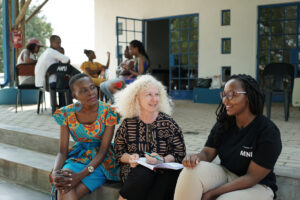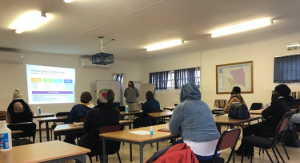The Unit has a strong capacity development objective. The approach has been to build the research pipeline from masters to PhD students, with intern opportunities feeding into this, then to host postdoctoral fellows and mentor young to mid-career scientists, including supporting their preparation for competitive fellowships and grants. In addition, the Unit is committed to ongoing education and training of its scientific and field staff (most field staff being from the Bushbuckridge / Mpumalanga setting where the Unit is located).
The Unit has contributed to capacity development through its internal academic programme, as well as through teaching underway as part of the School of Public Health academic programme. Further to this are broader training initiatives aimed at capacitating internal staff, health professionals and other groups detailed below.
The Unit’s support to research students and early career researchers includes the following:
- On-site seminar series and “Academic Fridays”, during which staff and students present work-in-progress for comment and critique, followed by a period of dedicated writing
- Participation in the Interdisciplinary PhD Programme in Public and Population Health, School of Public Health
- Agincourt data website (http://www.agincourt.co.za/DataSection/ which provides students with resources to familiarise themselves with HDSS data and prepare a data request using the freely available 1-in-10 sample dataset (anonymised 10% sample of the Agincourt HDSS database that retains the relational, temporal and data integrity of the full database). A data dictionary, data request and data agreement forms are provided.
 Over the past 10-years, several Unit research and management staff obtained or are working on higher degrees while conducting and managing research: a total of 4 Masters and 8 PhDs have graduated over the past 10 years, and 3 members of staff have completed postdoctoral fellowships and moved into mid-career positions. A number of these Unit staff have been awarded competitive personal fellowships that indicate high level recognition of research capacity and potential (from funders such as SAMRC, NIH, Fogarty Center, etc.)
Over the past 10-years, several Unit research and management staff obtained or are working on higher degrees while conducting and managing research: a total of 4 Masters and 8 PhDs have graduated over the past 10 years, and 3 members of staff have completed postdoctoral fellowships and moved into mid-career positions. A number of these Unit staff have been awarded competitive personal fellowships that indicate high level recognition of research capacity and potential (from funders such as SAMRC, NIH, Fogarty Center, etc.)
In addition, the Unit has supported the following formal teaching courses on offer to students enrolled at the University of the Witwatersrand (in Public Health, Demography and Population Studies programme, medical students in the Faculty of Health Sciences):
- Introduction to Data Management, Systems, Structures and Models (Masters level)
- Module on Data Processing, Distribution and Archiving (Masters level)
- Programming for Research Data management (Masters level)
- Applied field-based Epidemiology (Masters level)
- Event History Analysis Seminar (Honours and Masters level)
- Public engagement in community-based research (Advanced medical students)
- Seminars and facilitated field assignments (Advanced medical students)
- Training of African PhD students through the Consortium for Advanced Research Training in Africa (CARTA) programme (PhD level)

Over the past twenty years, the Unit has focused on building a strong graduate training programme. Taking advantage of the Unit as an exceptionally strong research environment, research students are exposed to multidisciplinary approaches, rigorous study designs and field procedures, robust field management, effective community engagement, and pro-active policy translation. While we focus largely on doctoral training, the Unit also support masters-level students in order to build an effective masters-PhD-postdoctoral pipeline. In more recent years, we have expanded our post-doctoral programme offering support and opportunity for early career researchers to join our multidisciplinary team. A key enabling factor is the Unit’s integration within the Wits School of Public Health and the School’s PhD programme. A proportion of students attached to the Unit are linked to research collaborations and partnerships with outside institutions where co-supervision of research is shared across staff of these institutions.
The below figures highlight key features of our post-graduate student programme and its evolution over time. Over the past 20 years, 154 students have graduated through the Unit. Of these, 56 have completed Master’s degrees, 69 have graduated with PhDs and 29 have completed postdoctoral fellowships (see Figure 1). In 2022, the Unit has 42 students enrolled in its graduate programme. The ratio of females to males is 1.8:1, and Black/Asian to white students 2.2:1 (see Figures 2 and 3). Of those currently enrolled, 69% are South African or from other sub-Saharan African countries highlighting a strong regional footprint.

Figure 1. Increases in PhD graduates and completed post-doctoral fellowships over time

Figure 2. Current student enrolments (2022) by sex

Figure 3. Current student enrolments (2022) by country of origin
In addition, various training workshops have been organized for staff:
Occupational Health Safety and Environment; ERP systems-(Oracle, Procure to Pay,HR Online, Pastel Sage Evolution); Performance Management; Fast track to Leadership and Development; MS Office; Employee relations; Fleet management; Supervisory Development Programme; Exceptional Office Management.
Retirement planning; Fundamentals of Project Management; Resilience for managers; Personal excellence; Money Sense.
